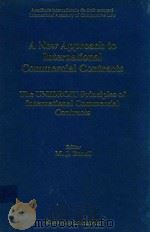《INTERNATIONAL STANDARD CONTRACTS THE PRICE OF FAIRNESS》
| 作者 | 编者 |
|---|---|
| 出版 | GRAHAM TROTMAN MARTINUS NIJHOFF |
| 参考页数 | 339 |
| 出版时间 | 1991(求助前请核对) 目录预览 |
| ISBN号 | 0792307097 — 求助条款 |
| PDF编号 | 812918568(仅供预览,未存储实际文件) |
| 求助格式 | 扫描PDF(若分多册发行,每次仅能受理1册) |

Chapter Ⅰ.Introduction1
Ⅰ.Origin and Shaping of Standard Forms1
Ⅱ.Survey of International Standard Contracts2
A.Standard conditions drafted by individual enterprises2
B.Standard conditions issued by trade associations3
C.International organizations drawing up general conditions and standard form contracts4
Ⅲ.The Law of International Standard Contracts6
A.International trade law as part of private international law6
B.The Proper Law7
C.Scope of the law of international standard contracts10
Ⅳ.Special Standard Contracts11
Chapter Ⅱ.The Proper Law13
Ⅰ.Internationalized Standard Contracts and Lex Mercatoria13
Ⅱ.The Law that the Proferentem of the Form Had in Mind and the Proper Law of the Form19
Ⅲ.The Law of the Adherent's Place of Business20
Ⅳ.The Proper Law of the Form or the Proper Law of the Contract?20
Chapter Ⅲ.The proper Law and Substantive Autonomy25
Ⅰ.Conflict Autonomy Implies a Substantive Autonomy of the Parties to an InternationalContract25
Ⅱ.The Emerging Self-Limitation of Mandatory Rules to Domestic Contracts27
Ⅲ.Special Law for International Contracts29
Ⅳ.Substantive Autonomy and Recognition of Foreign Judgments and Arbitral Awards33
Ⅴ.Professor Batiffol's First Comments on "Substantive Autonomy"34
Ⅵ.Professor Batiffol's Second Comments on Substantive Autonomy38
Ⅶ.Professor Hans Stoll's Restricted Reception of Substantive Autonomy40
Ⅷ.Professor Picone's Proposal on Substantive Autonomy43
Ⅸ.Substantive Autonomy and Art.3(3) of the ECC Convention on the Law Applicable to Contractual Obligations44
Ⅹ.Substantive Autonomy and International Commercial Arbitration46
Ⅺ.Substantive Autonomy and Procedural and Substantive Fairness47
Ⅻ.Substantive Autonomy and Fair Competition48
ⅩⅢ.Substantive Autonomy and Fairness of Price50
ⅩⅣ.Substantive Autonomy and the Meaning of "Law"54
ⅩⅤ.The Borderlines of Substantive Autonomy55
ⅩⅥ.Substantive Autonomy and Fuller's Eight Principles of an "Inner Morality of Law"56
Chapter Ⅳ.Formation of the Contract59
Ⅰ.Substantive Rules in the Various Legal Systems59
A.Incorporation of general conditions by previous course of dealing59
B.Incorporation by reasonable notice63
C.The "battle of forms"67
D.A special choice of form rule for the "battle of forms"?70
E.The form of contracts71
Ⅱ.Conflict Rules72
A.The putative proper law72
B.The personal law of the offeree72
C.The personal law of the offeree governing the incorporation of standard conditions76
D.Incorporation and conflict of choice-of-law clauses78
E.Personal law of the offeree and substantive autonomy79
F.The risk of language80
Chapter Ⅴ.Interpretation of the Contract83
Ⅰ.Interpretation and Essential Validity83
Ⅱ.Interpretation as a Question of Law84
Ⅲ.The "Open Texture of Language"84
Ⅳ.Construction and Reasonableness85
Ⅴ.The Legal Background of Expressions86
Ⅵ.Conflict of Choice-of-Law Terms Settled by Interpretation87
Ⅶ.Principles and Rules of Interpretation87
Ⅷ.Meaning of Standard Terms90
Ⅸ."Leading Interpretation" of General Conditions and Standard Form Contracts Issued by International Organizations92
Chapter Ⅵ.Material or Essential Validity95
Ⅰ.Substantive Principles in the Various Legal Systems95
A.Unconscionability95
B.Good faith97
C.Negligence97
D.Reasonableness98
E.Deviation from fundamental principles of the statutory rules99
Ⅱ.Conflicts Rules99
A.The proper law99
1.Choice of law by standard clauses99
2."Floating" choice of law clauses104
3.Substantive autonomy through standard conditions and conflict autonomy106
4.Self-regulatory standard contracts?110
5.Protection of the weaker party(who should be protected?)112
(a) Typically weak parties112
(b) Atypically weak parties115
B.The exceptions to the rule of the proper law116
1.The exclusive rules of the forum116
2.Principles of public policy regarding the "forum"117
3.The exclusively applicable rules of a third country118
Chapter Ⅶ.Effects of the Contract129
Ⅰ.The Effects of Non-Incorporation and Invalidity129
Ⅱ.Seriousness of Breach130
Chapter Ⅷ.Fairness Estoppel and the Price of Fairness141
Ⅰ.Control of Standard Form Contracts and Control of "Individual Contracts"141
Ⅱ.Unfair Terms in International Standard Contracts142
Ⅲ.By Way of Analogy142
Ⅳ.Fairness Estoppel and the Price of Fairness143
Ⅴ.Procedural and Substantive Fairness in the 'George Mitchell' Case144
Ⅵ.The 'Fairness Estoppel' as Decisive Factor145
Ⅶ.The Allocation of Risks,the Price of Fairness and the Price for Nothing148
Ⅷ.Legal "Techniques" and a Purposive Approach to the Law of International Standard Contracts149
Chapter Ⅸ.Functional Comparison151
Ⅰ.The Interplay of General Principles151
Ⅱ.The Equivalence of Specific Principles and Rules153
Ⅲ.The Main Purpose of Just Solutions160
Bibliography165
Appendix of Cases175
Index337
1991《INTERNATIONAL STANDARD CONTRACTS THE PRICE OF FAIRNESS》由于是年代较久的资料都绝版了,几乎不可能购买到实物。如果大家为了学习确实需要,可向博主求助其电子版PDF文件(由 1991 GRAHAM TROTMAN MARTINUS NIJHOFF 出版的版本) 。对合法合规的求助,我会当即受理并将下载地址发送给你。
高度相关资料
-

- PRINCIPLES OF THE LAW OF CONTRACTS
- 1947 THE BOBBS-MERRILL COMPANY
-

- FAIRNESS IN INTERNATIONAL LAW AND INSTITUTIONS
- 1995 CLARENDON PRESS
-

- A NEW APPROACH TO INTERNATIONAL COMMERCIAL CONTRACTS THE UNIDROIT PRINCIPLES OF INTERNATIONAL COMMER
- 1999 KLUWER LAW INTERNATIONAL
-

- THE PRICE OF A CHILD
- 1995 VINTAGE BOOKS
-

- PALESTRINA
- 1971 OXFORD UNIVERSITY PRESS
-

- HANDBOOK OF THE LAW OF CONTRACTS
- 1954 WEST PUBLISHING CO.
-

- CONTRACTS FOR INTERNATIONAL SALE OF COODS
- 1980 MARTINUS NIJHOFF PUBLISHERS
-

- International Contracts and Payments
- 1991 Springer
-

- THE ECONOMICS OF PRICE DISCRIMINATION
- 1983 CAMBRIDGE UNIVERSITY PRESS
-

- THE PRICE OF PEACE
- 1945 W. W. NORTON & COMPANY . INC. New York
提示:百度云已更名为百度网盘(百度盘),天翼云盘、微盘下载地址……暂未提供。➥ PDF文字可复制化或转WORD




